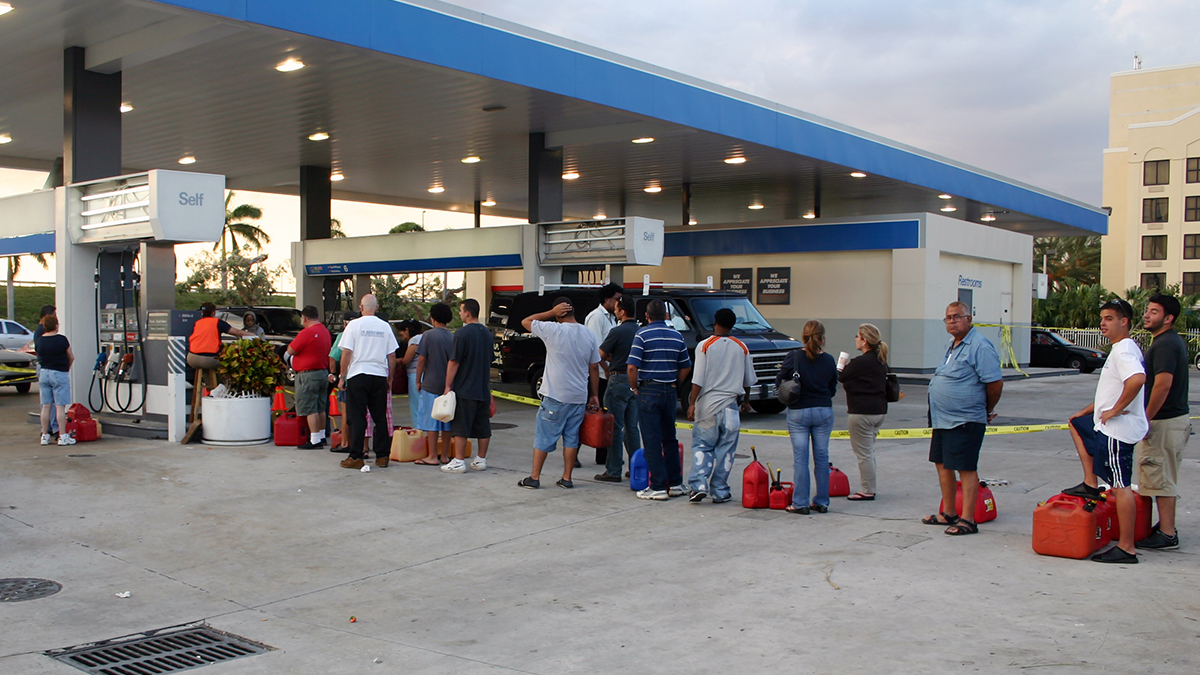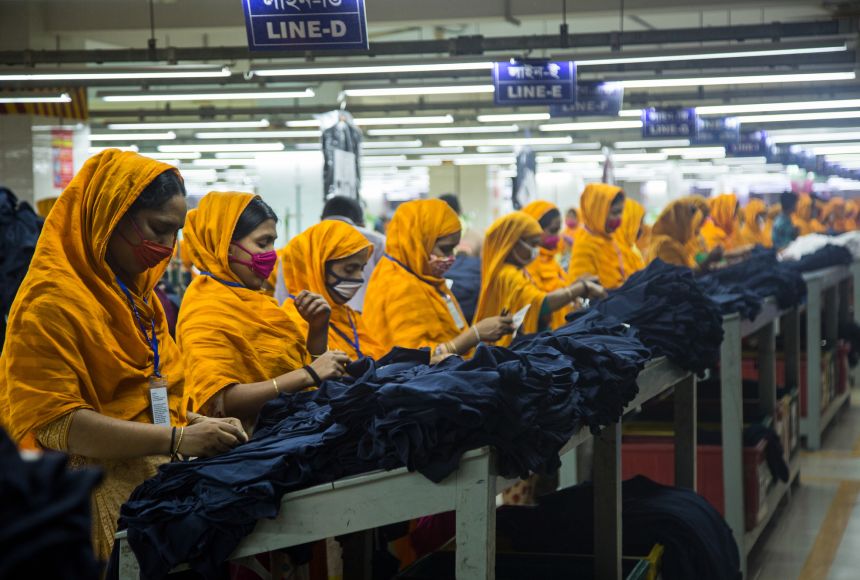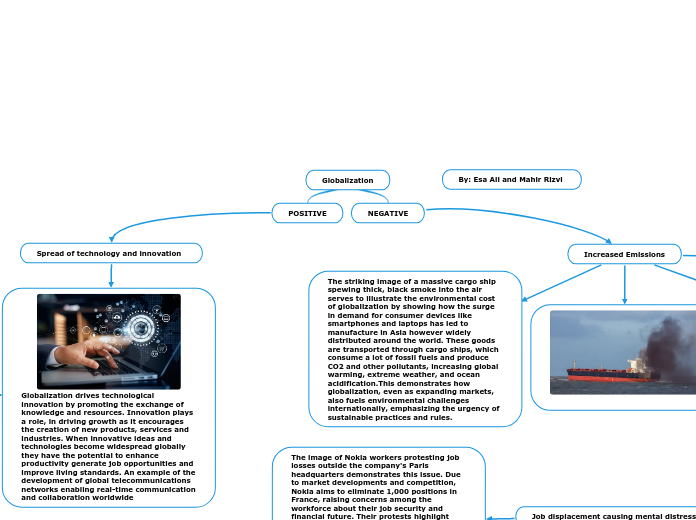Globalization
POSITIVE
Spread of technology and innovation

Globalization drives technological innovation by promoting the exchange of knowledge and resources. Innovation plays a role, in driving growth as it encourages the creation of new products, services and industries. When innovative ideas and technologies become widespread globally they have the potential to enhance productivity generate job opportunities and improve living standards. An example of the development of global telecommunications networks enabling real-time communication and collaboration worldwide
Economic Growth
Globalization facilitates the flow of goods, services, and capital across borders, fostering economic growth. Economic growth can lead to increased cultural exchange through international tourism, media, and entertainment industries. This fosters cross-cultural understanding and globalization of cultural products. An example of economic growth includes the rise of multinational corporations like Apple, with its global supply chain and customer base, contributing to economic growth.
Cultural Exchange

Globalization promotes cultural exchange and diversity by connecting people from different backgrounds, this promotes mutual understanding and appreciation of different cultures, reducing stereotypes and prejudices. A recent example of cultural exchange is, the popularity of K-pop, a South Korean music genre, spreading worldwide, showcasing cultural diversity.
Access to Information

Globalization improves access to information, empowering individuals with knowledge from around the world. The exchange of information promotes the exchange of knowledge and skills across regions. People, institutions and governments can benefit from each others experiences and successful strategies, which ultimately enhances decision making and the ability to solve problems effectively. A everday example is the use of the internet and platforms like Wikipedia providing access to a vast repository of information.
Global Collaboration

Global collaboration in globalization refers to countries and organizations working together on various issues, leading to shared benefits and advancements. This cooperation fosters mutual growth and development on a global scale. An example of the COVID-19 pandemic showcased the power of global collaboration. Governments, pharmaceutical companies, and international organizations came together to develop and distribute vaccines worldwide, highlighting the positive impact of cooperation in globalization.
NEGATIVE
Increased Emissions
The striking image of a massive cargo ship spewing thick, black smoke into the air serves to illustrate the environmental cost of globalization by showing how the surge in demand for consumer devices like smartphones and laptops has led to manufacture in Asia however widely distributed around the world. These goods are transported through cargo ships, which consume a lot of fossil fuels and produce CO2 and other pollutants, increasing global warming, extreme weather, and ocean acidification.This demonstrates how globalization, even as expanding markets, also fuels environmental challenges internationally, emphasizing the urgency of sustainable practices and rules.

Illegal Deforestation and Removal of Habitats
Globalization is greatly impacted by deforestation, which is supported by industries like agricultural and meat production. The degradation of these crucial ecosystems has an impact on biodiversity, global climate laws, and even the world economy. The effects include changes to the world's weather patterns, the extinction of rare species, and the release of carbon dioxide stored in the earth's atmosphere into the environment, which worsens weather exchange.

The picture shows the remains of an illegal gold mining site inside a Yanomami reserve in the Amazonian jungle. It provides a stark reminder of the growing deforestation issue in Brazil, which affects both officially protected and Indigenous territory.The destruction of the Amazon rainforest, which is generally pushed by monetary interests such as agriculture and red meat exports, disrupts global climate patterns, threatens biodiversity, and contributes to climate change. This disaster serves as a harsh reminder of how interrelated global issues are. Ecosystems, weather, and biodiversity may be affected significantly by economic needs and practises in one region of the world. It emphasizes the pressing need for worldwide cooperation and sustainable strategies in the age of globalization.
Exploitation of Workers
Job displacement causing mental distress
The image of Nokia workers protesting job losses outside the company's Paris headquarters demonstrates this issue. Due to market developments and competition, Nokia aims to eliminate 1,000 positions in France, raising concerns among the workforce about their job security and financial future. Their protests highlight how globalization's financial shifts can cause actual-world job displacement and mental health issues among people. It underscores the significance of addressing now not most effectively the financial but also the human dimensions of globalization through supportive rules and measures to guard people' well-being.

Globalization is largely influenced by the impact on job displacement caused by import competition. People who are subject to import competition have lower growth in wages, less job satisfaction, and smaller financial expectations. The impact of globalization on people's mental health is shown by changes in people's characteristics that are highly correlated with higher levels of mental distress.
Potential Health Risks
Financial Crisis

The world economy has been significantly influenced by a number of global disasters that occurred in 2022, including the COVID-19 pandemic, the conflict in Ukraine, inflation, and others. As a result, linked economies are facing disruptions in their supply chains, trade and financial markets, which has major consequences for globalization. The global power crisis and the recession in key economies have increased unpredictability, demonstrating how developments in one sector may have an impact on outcomes in other parts of the world and emphasizing the interdependence of nations within the global financial system.
In the image, people are seen waiting to fill up their petrol cans while standing in a long queue at a petrol station. The impact of the outlined economic difficulties on the real world is shown by this image. People have been forced to wait in lines for essential resources like fuel as a result of a combination of supply problems. This has greater consequences for companies, transportation, and businesses dependent on affordable energy supplies in addition to having an impact on individual customers. Furthermore, both emerging and developed nations have been impacted by the global economic decrease which led to them having tightening financial conditions. Due to the interconnectedness of the world's financial markets, disturbances anywhere in the system can have an influence on investment, change, and normal economic growth.
Our world is now more connected due to globalization, which has increased business and tourism. However, it has also sparked worries about potential risks to health and fitness. Poor hygiene, free laws, crowded living conditions, and proximity to transportation hubs can all contribute to the development of circumstances that facilitate the spread of disease. This demonstrates the need for international collaboration in identifying and addressing health-related concerns. Therefore, health-related risks have become a key component of globalization.

The image shows a woman wearing a mask in a busy international airport. The hazards associated with cross-border travel and its contemporary reality are shown by this image. A case in instance is how the COVID-19 outbreak coincided with China's 2020 Lunar New Year celebrations. During this time, there was a significant increase in the number of people traveling around, which contributed to the spread of the virus and caused severe quarantine regulations as well as disruptions to people's lives, businesses, and the world economy. The advantage of long-distance air travel is that someone carrying a contagious illness may travel the world in a matter of hours, possibly infecting communities lacking immunity. This demonstrates how the threat of rapid disease transmission has increased due to globalization and emphasizes the importance of international cooperation in solving public health challenges in our society.

Globalization has a significant global impact on labor markets. People in developed nations frequently face competition from lower-cost markets, which results in a lack of confidence and lower pay. This dynamic worsens income inequality, especially for low-skilled workers who bear the weight of globalization's demands. This may also spark questions about low wages and inadequate workplace protections, which are examples of exploitation of workers.
A visual representation of how globalization affects labor is provided by the image of Bangladesh's thriving garment industry. The severe pay difference between Bangladeshi textile workers and their counterparts in developed nations is graphically depicted, highlighting both the ethical and financial implications of globalization.The world's financial system's interconnection is shown by this clear picture, which also draws attention to the pressing need for morally responsible behavior and coordinated international action to protect workers' rights in our society.
